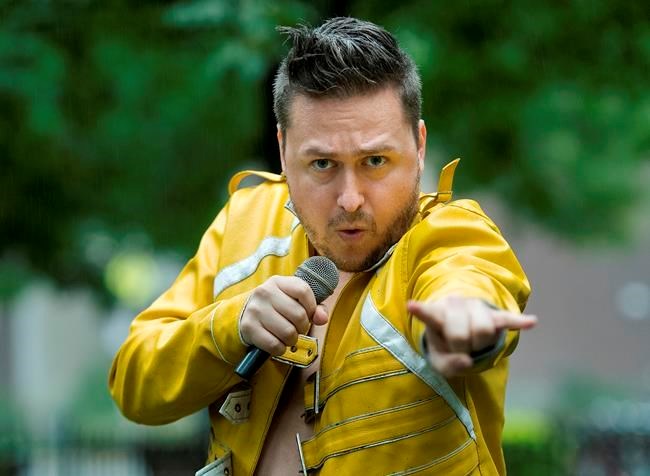MONTREAL — Mike Charlebois describes karaoke as a way of life, a form of expression and a little bit of escapist fun — something he says is more important than ever as the world grapples with a health crisis.
"Whether you have talent or you don't, you have a microphone, you have a stage, you have lights projected on you, you're a star for a moment, regardless of who you are," said Charlebois, a professional performer, host and karaoke event organizer in the Montreal area.
Those fleeting moments of wannabe rock stardom are coming to an end. On Friday, the Quebec government announced an immediate ban on karaoke perfomances in public spaces after an outbreak at a Quebec City bar was linked to dozens of cases.
The province's top doctor, Horacio Arruda, has said the combination of droplet-projecting singing, shared microphones and alcohol consumption make karaoke the ideal environment to spread COVID-19.
But singers and bar owners who aren't ready to stash their microphones say the activity can be safe and worry all karaoke enthusiasts are being punished for the acts of an irresponsible few.
A well-known Quebec performer whose stage name is Billy Karaoke said it's not karaoke that's the problem. "The problem is the management of the bars that doesn't respect the rules," he said.
The 30-year-old, known for filmed stunts such as trying to get arrested while singing karaoke, organized a pro-karaoke demonstration in Montreal over the weekend at which he and his fans sang and waved signs denouncing "karaoke-phobia."
The artist, who would not divulge his real name, said almost everyone in the karaoke community follows the rules, including hand washing, social distancing, wearing masks between performances and disinfecting microphones and using removable covers.
"All the karaoke community is going to pay for some stupid guys in Quebec who said, 'We don't care about the rules,'" he said in a phone interview.
Le Kirouac, the Quebec City bar at the heart of the controversy, had been linked to 72 direct cases of COVID-19 as of Thursday. Health officials are no longer giving out the number of secondary cases connected to the bar, but they previously said there were at least 10, including some among schoolchildren.
Police in Sherbrooke, Que. also intervened at two bars in the Sherbrooke area over the weekend, including one karaoke bar where they said physical distancing rules weren't being respected.
The owner of those bars, Stephane Goulet, has speculated that his public advocacy for karaoke may have played a part in bringing the police to his door.
Goulet said he has followed all health directives, including putting up Plexiglas in front of the singer and a sophisticated disinfection box for microphones that's "the same system that's used in operating rooms." His workers remind people about hand washing and masks.
"If it's well done, I don't think there's a bigger risk than going to a store and buying a box of cereal than handling a sterilized microphone," he said.
But Goulet, who has not yet received a fine, acknowledges it can be difficult to ensure all customers are following the rules. He maintains it's not fair to ask business owners to bear all responsibility for enforcing government directives.
Billy Karaoke, meanwhile, bristles at the idea that karaoke is a frivolous activity that should simply be suspended for the duration of the pandemic.
Those who say that, he says, have "clearly never felt what it's like to sing Bohemian Rhapsody in front of a crowd looking at you in wonder."
"It has a therapeutic effect," he said. "For the people who say, 'I don't think karaoke is essential,' well I think it's more essential than ever."
Charlebois says the pandemic has caused a certain amount of "psychological distress," particularly for musicians and artists. While karaoke won't save everything, he believes it fills a need.
"Across this pandemic and these rules, we still have to be able to live, and be able to express ourselves," he said. "And karaoke is a very good vehicle to express ourselves, our joy, our pain."
He said the vast majority of karaoke organizers and fans have followed the rules because they don't want to go back to "singing alone in the shower."
Now, thanks to what he sees as a small group of irresponsible people and a "unilateral" government decision, the worst is coming to pass.
This report by The Canadian Press was first published Sept 11, 2020
Morgan Lowrie, The Canadian Press



